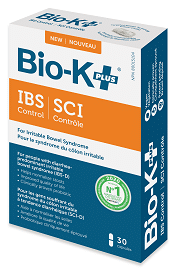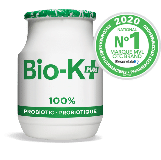Product Review
Bio-K+® Help for Your Microbiome
Bio-K+® is a probiotic formulation available in a variety of fermented substrates, including dairy, soy, and brown rice, making it ideal for people with celiac disease, specific allergies (e.g., milk proteins, soy), or intolerances (e.g., gluten or lactose).
The liquid products are not yogurts, as you might expect, but a fermented base that supports the survival of the probiotic strains. Bio-K+® is also available in enteric-coated capsules, which make it easier for the live bacterial cultures to reach your intestines without stomach acids destroying them before they have a chance to be useful.
Irritable Bowel Syndrome (IBS)
 IBS symptoms can significantly reduce a person’s quality of life. In a large Canada-wide study we conducted in 2016,1 76% of respondents reported that their IBS symptoms interfere with their everyday life such as work, school, and social situations. Disruption to everyday life can include loss of bowel control (fecal incontinence).
IBS symptoms can significantly reduce a person’s quality of life. In a large Canada-wide study we conducted in 2016,1 76% of respondents reported that their IBS symptoms interfere with their everyday life such as work, school, and social situations. Disruption to everyday life can include loss of bowel control (fecal incontinence).
Bio-K+® IBS Control is a clinically proven probiotic combination capsule authorized by Health Canada for adults with diarrhea-predominant irritable bowel syndrome (IBS-D).2 The product contains three probiotic strains: Lactobacillus acidophilus CL1285® (L. acidophilus), Lactobacillus casei LBC80R® (L. casei), and Lactobacillus rhamnosus CLR2® (L. rhamnosus). This unique combination of lactobacilli strains helps individuals with IBS manage symptoms by improving stool consistency and frequency, thereby improving quality of life.
Bio-K+® IBS Control capsules are lactose-free, vegan and gluten-free. The ingredients are considered non-GMO. Each enteric-coated capsule contains a minimum of 50 billion colony-forming units (CFU). Adult dose is two capsules, once a day.
Several small studies have evaluated the three probiotic strains combined in Bio-K+® IBS Control for their safety, effectiveness, and quality. In a randomized clinical trial3 of 113 patients with IBS, results showed that those taking Bio-K+® reported significant improvements in symptoms and quality of life, including decreased pain and increased satisfaction with bowel habits. Women had a greater degree of improvement in symptoms and quality of life than did men overall, particularly for women with IBS-D. This is important, since IBS is more prevalent in women than in men. A small published abstract4 analyzing 38 participants’ diaries revealed a significant reduction in the number of days with severe pain for those with IBS receiving Bio-K+® (n=26) as compared to the placebo group (n=12).
Other Gastrointestinal Conditions
 Over the past few years, multiple clinical trials have demonstrated that the Bio-K+® probiotic combination of L. acidophilus CL1285, L. casei LBC80R, and L. rhamnosus CLR2 is effective at reducing the incidence of antibiotic associated diarrhea (AAD) and Clostridioides difficile infection (CDI).5,6,7 These results were from several very large trials in which participants prescribed antibiotics were also given BioK+® to control the side effects of these drugs.8 Laboratory (in vitro) studies also showed that the Bio-K+® strains slowed the growth of food-borne and nosocomial pathogens such as Escherichia coli, Enterococcus faecalis, E. coli O157:H7, and Staphylococcus aureus,9 and methicillin-resistant Staphylococcus aureus (MSRA).10
Over the past few years, multiple clinical trials have demonstrated that the Bio-K+® probiotic combination of L. acidophilus CL1285, L. casei LBC80R, and L. rhamnosus CLR2 is effective at reducing the incidence of antibiotic associated diarrhea (AAD) and Clostridioides difficile infection (CDI).5,6,7 These results were from several very large trials in which participants prescribed antibiotics were also given BioK+® to control the side effects of these drugs.8 Laboratory (in vitro) studies also showed that the Bio-K+® strains slowed the growth of food-borne and nosocomial pathogens such as Escherichia coli, Enterococcus faecalis, E. coli O157:H7, and Staphylococcus aureus,9 and methicillin-resistant Staphylococcus aureus (MSRA).10
If you are taking Bio-K+® to minimize the side effects of antibiotics, you should consume the product two to three hours after each dose of antibiotics.
Comments
Unlike most other probiotic products, which usually only include the number of guaranteed live bacterial cultures at the date of manufacture, Bio-K+®’s expiration date guarantees a particular potency of the live bacterial culture up to that date. This is a significant feature because probiotics must be alive in order for them to work. Bio-K+® is widely available in grocery stores, health food stores, and pharmacies across Canada and some products are available through online retailers.
Physicians and other healthcare practitioners recommend Bio-K+® products to treat certain gastrointestinal conditions and, since it is available without prescription, many healthy individuals use the product for ongoing immune or digestive support. Please consult your healthcare provider for more information about this product in your specific digestive care.
Bio-K Plus International is a family-run biotech company based in Laval, Québec. It specializes in the research, manufacturing and marketing of the Bio-K+® probiotic.















